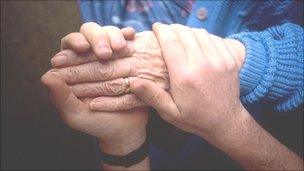Warning over cuts to support fund for vulnerable
- Published

The elderly, women at refuges and rough sleepers benefit from the fund
A union has launched a campaign against cuts to a government fund supporting victims of domestic violence, the homeless and the elderly in England.
Unison said more than one million people benefit from the Supporting People programme but warned councils face losing tens of millions of pounds.
General secretary Dave Prentis said it would mean "shelters shut, beds lost".
The Department for Communities and Local Government (DCLG) said it was committed to helping the vulnerable.
According to Unison, 10 councils - including Liverpool, Leeds, Manchester and Nottingham - face cuts of more than £5m each.
Twenty-two councils face cuts of up to 20% and seven - including West Berkshire, York and Bournemouth - are having the funds reduced by between 40% and 50%.
Mr Prentis said: "All over the country, Supporting People grants fund women's refuges, providing a haven for victims of domestic abuse.
"They help keep people who have fallen on hard times from sleeping rough, and give people with mental health problems a roof over their heads.
'Clearly recognised'
"More than 800,000 elderly people rely on services funded through Supporting People. Drastic cuts will mean shelters shut, and beds lost, pushing vulnerable people onto the streets or leaving them without the help they need," he said.
A DCLG spokesperson said the importance of the Supporting People programme in helping vulnerable people was "clearly recognised" in the government's Spending Review, "where [the government] committed to investing £6.5bn over the next four years".
He said, nationally, for every pound of Supporting People funding provided last year, 99p will be provided this year.
He went on to say: "The Supporting People ringfence was removed in April 2009 which gives local authorities maximum flexibility to meet local priorities.
"While we recognise the challenges councils are facing, we do expect to see them match the government's commitment to help the most vulnerable people in society.
"There is no excuse for councils to be targeting any disproportionate spending reductions on programmes that support the most vulnerable people in their communities."